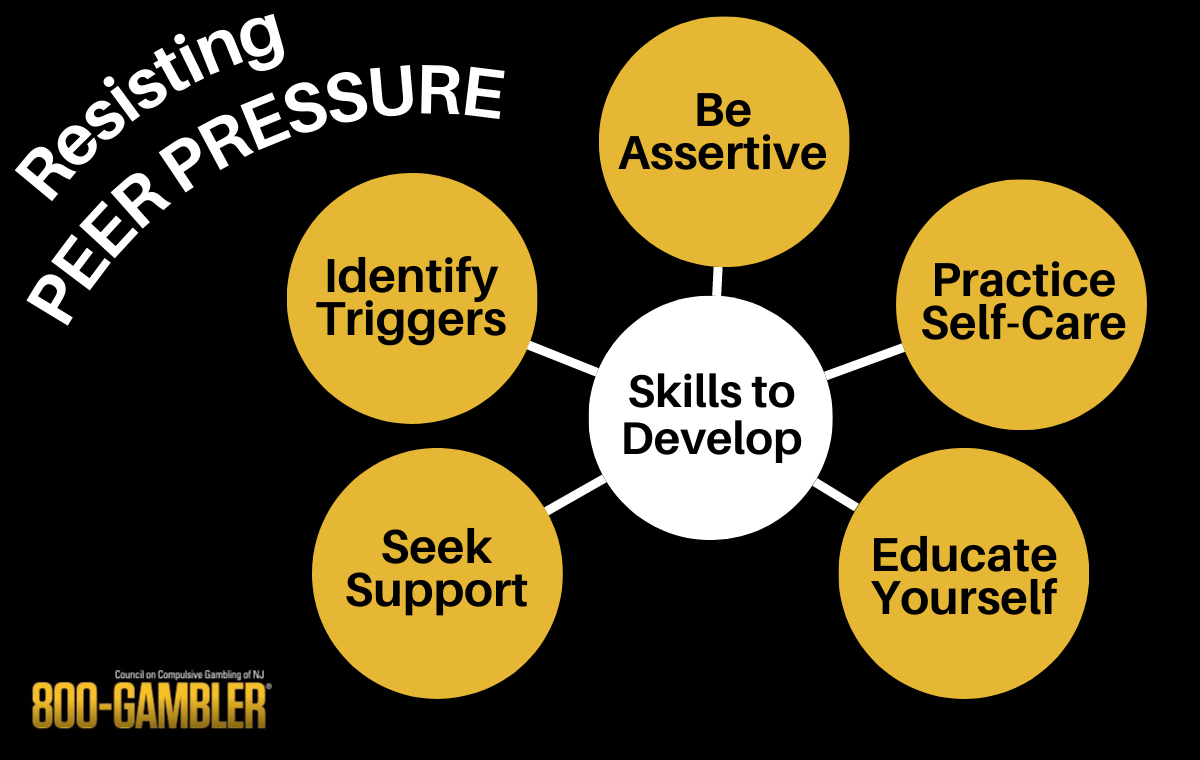Peer pressure can be a significant factor that influences people from all walks of life, and for individuals with a gambling problem, the impact of peer pressure can be even more pronounced. In this article, we’ll discuss how problem gamblers can effectively handle peer pressure, safeguard their mental health, and make informed decisions about gambling behavior.
Understanding Peer Pressure and Gambling Activity
Peer pressure refers to the influence exerted by individuals within a social group to conform to certain behaviors, attitudes, or actions. For problem gamblers, the presence of peer pressure can exacerbate their gambling problems. The desire to fit in, avoid exclusion, or seek approval from social groups may lead individuals to engage in excessive gambling activity despite the negative consequences it might have on their mental health and well-being.
Research indicates a clear link between peer pressure and increased engagement in gambling activity, especially among young people. Young adults and adolescents are particularly susceptible to peer influence as they seek to establish their identity and gain acceptance within their social circles. As gambling becomes a normalized activity within these groups, individuals may feel compelled to participate, even if they have already lost bet games multiple times.
Recognizing the Signs of Peer Pressure
It is crucial for problem gamblers to be able to recognize the signs of peer pressure. By understanding these signs, individuals can better navigate situations where they might feel compelled to engage in gambling activities against their better judgment. Some common signs of peer pressure include:
- Direct encouragement: Friends or acquaintances directly urging someone to gamble or take part in specific gambling activities.
- Social exclusion: Fear of being excluded from a social group if one does not participate in gambling.
- Teasing or mocking: Ridiculing or making fun of someone for not engaging in gambling activities.
- Pressured decision-making: Feeling rushed or coerced into making quick decisions about gambling without proper consideration of the consequences.
- Group dynamics: Feeling influenced by the collective behavior of a social group engaging in gambling activities.
Strategies for Handling Peer Pressure
There are several methods you can use to handle peer pressure. Here are some techniques to try:

Communicate Assertively
Developing assertiveness skills can empower problem gamblers to express their boundaries and make independent decisions. By communicating your concerns and desires clearly, you can reduce the impact of peer pressure.
Seek Support
Surrounding yourself with a supportive network can be instrumental in managing peer pressure related to gambling. Joining support groups, such as Gamblers Anonymous or seeking professional counseling, can provide a safe space to discuss your challenges, seek advice, and receive encouragement from individuals who understand what you are going through.
Identify Triggers
Understanding your personal triggers for gambling can help you anticipate situations where peer pressure may arise. For example, if specific social events tend to involve gambling, consider suggesting alternative activities or finding other friends to spend time with. If you feel like you can’t resist the urge to gamble, consider self-exclusion from Parx Casino and other local gambling venues.
Practice Self-Care
Engaging in activities that bring you joy, practicing mindfulness or relaxation techniques, and maintaining a healthy lifestyle can build resilience against peer pressure and help you make more informed choices regarding your gambling behavior.
Educate Yourself
Being well-informed about the potential risks and consequences associated with excessive gambling activity can empower you to resist peer pressure. Stay up to date with reliable sources of information on gambling-related topics and learn about the negative impact that gambling problems can have on mental health, relationships, and finances.
Help Is Here For You!
Handling peer pressure is an essential aspect of managing a gambling problem effectively. By recognizing the signs of peer pressure, developing assertiveness skills, seeking support, identifying triggers, practicing self-care, and educating themselves,, problem gamblers can navigate social situations and make healthier choices regarding their gambling behavior.
Remember, if you or someone you know is struggling with a gambling problem, 800-GAMBLER is always here for you. Our confidential, toll-free helpline is open 24/7 and we’re ready to connect you with the resources you need. Get in touch with us today and make a change in your life!
Sources:
Paolo Bozzato, Claudio Longobardi & Matteo Angelo Fabris (2020) Problematic gambling behaviour in adolescents: prevalence and its relation to social, self-regulatory, and academic self-efficacy, International Journal of Adolescence and Youth, 25:1, 907-919. https://www.tandfonline.com/doi/pdf/10.1080/02673843.2020.1772842



